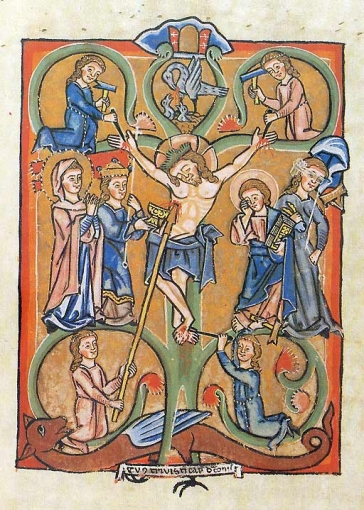Podcast: Play in new window | Download
Subscribe: Spotify | Email | RSS

As we saw in episode 91, there’s a crowded field of atonement theories. Can we rule some of them out?
In the first portion of this episode Dr. Thurow offers objections to subjective theories, and to penal substitution, ransom, and christus victor theories of atonement.
Dr. Thurow then sketches his own, original approach to understanding atonement, which focuses on the collective sin of the human race. This theory is supposed to better fit the Bible, and to make better moral sense out of Jesus’s once and for all atonement.
You can also listen to this episode on Stitcher or iTunes (please subscribe, rate, and review us in either or both – directions here). It is also available onYoutube (scroll down – you can subscribe here). If you would like to upload audio feedback for possible inclusion in a future episode of this podcast, put the audio file here.
Links for this episode:
- Dr. Thurow’s home page @ UTSA
- The Center for Philosophy of Religion @ The University of Notre Dame
- Yom Kippur in Leviticus 23 and as understood in present-day Judaism
- Jacob Milgrom’s commentary on Leviticus: Part 1, Part 2
- Jonathan Klawans, Purity, Sacrifice, and the Temple Symbolism and Supersessionism in the Study of Ancient Judaism (kindle)
- This week’s thinking music is “Clover” by Little Glass Men.


A great discussion. One obvious oversight of Dr Thurow is that clearly the only begotten son of God would be qualified as a representative of man if he remained unblemished (sinless).
I liked a lot of what Dr. Thurow said on this podcast. I think he’s on the right track with a “representative” perspective on the atonement (rather than a substitutionary one). It doesn’t make sense that God would hold an innocent man accountable for the crimes of others or that unconditional love (grace) would be dependent upon retribution.
This idea of communal atonement is very interesting, and sounds promising. I am reminded of something I read recently by the theologian Peter Forsyth. The quote is from his book “The Principle of Authority” p. 400, available here: https://archive.org/details/principleofaut00fors
“God chose me, of course, as member of a great whole, a great community. In that and for that I am chose–gloriously doomed to fraternity as to sonship. So that the final and direct object of God’s choice is the Church, is Humanity as a Church, the New Humanity, and, indirectly each soul as a cell thereof. What is chosen is no Church regardless of single souls, but a Church with the very hairs of its head all numbered.” (400)
Dale,
I would’ve responded earlier today, but I was super tired from work. I was so eager to hear this one after having heard the last one. I am actually surprised, given all of the different views that Joshua gave, just how similar it is to my viewpoint.
Not surprisingly, given our shared understanding of Jesus having not been literally God, I didn’t agree with the last point, although I see the merits there. This is something that I have been kind of forced to consider, being that I have been confronted with it various times in the past — usually in the form of, “it takes an infinite being to offer a sufficient sacrifice for an infinite amount of sins.” This is of course one of the views rejected by Joshua, and the same with myself.
However, in looking at those things, I noticed that there doesn’t need to be a God-man in my view, although I think a representative of God is a must — even one who does have something in with God, like Joshua was letting on. For me, I see the author of Hebrews, for instance, pushing Jesus’ sonship in this regards. Because of understanding how the love, the sonship, the resurrection, and anointing all work together, I do feel that there is definitely something unique about Jesus. The Bible doesn’t explain exactly what prompted Jesus to be sinless — whether it was because he is God or because he was generated by God at his conception. Perhaps it’s because he was created by God specifically, much in the way that Adam was, and is in such a way called God’s son in Luke’s genealogy, although I don’t see that.
The authority over the people Joshua mentions towards the end is exactly what I was talking about when I said that his exaltation was necessary, because according to the Bible, that’s when he inherited not just Israel, but also all of the nations.
There are a ton of other things that could be mentioned, but just wanted to give a concise feedback on what was discussed and how it related to me, as you also seemed interested in what I had to say as well.
God bless!
Love in Him,
-Jon
Comments are closed.